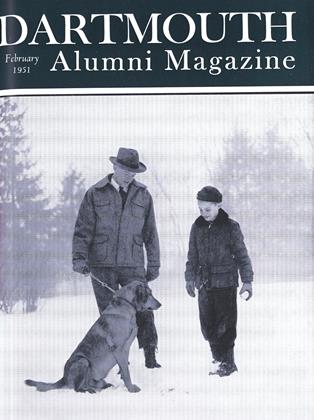by Charles T. Prouty '3l.Yale University Press, 1950, 142 pp., $2.50.
The second half of this book is a reprint of Peter Beverley's History of Ariodanto andGenevra, first published about 1566 in an edition of which only one copy seems extant, and never reprinted before. Professor Prouty has rendered a service to scholarship by reproducing and editing a rare document of considerable importance, even though Beverley's blathering transmogrification of Ariosto's Genevra incident is very dull.
The real worth of Mr. Prouty's book is hardly suggested by its title. It is improbable that any research will ever find or ascertain the "sources" of Much Ado about Nothing in the narrow sense of that term: nobody now knows what book Shakespeare read or what tale he heard that suggested to him the particular complications of the plot contrived around sweet innocent Hero "the slandered bride." But Mr. Prouty has given us an intelligent and enlightening discussion of materials and ideas which must have been familiar to Shakespeare in one form or another, and of Shakespeare's motives and methods in producing high comedy from crude stuff. Particularly useful is the light shed on Claudio, that execrable prig, who, as Mr. Prouty points out, was never meant to be romantic or admirable, but absurb, somewhat like Jane Austen's Mr. Collins, though unfortunately not so funny. Students of Much Ado should be grateful for Mr. Prouty's demonstration that the significance and coherence of the play are derived from consistent though varied ridicule of false doctrines about love and marriage—falsely romantic, falsely mercenary, falsely cynical.
 View Full Issue
View Full Issue
More From This Issue
-
 Article
ArticleThe Student Days of Richard Hovey
February 1951 By EDWARD C. LATHEM '51 -
 Class Notes
Class Notes1929
February 1951 By F. WILLIAM ANDRES, EDWIN C. CHINLUND, JACK D. GUNTHER -
 Article
ArticleSIGHTED and SUNK
February 1951 By JOHN HURD '21 -
 Class Notes
Class Notes1918
February 1951 By ERNEST H. EARLEY, DONALD L. BARR, DAVID L. GARRATT -
 Class Notes
Class Notes1933
February 1951 By GEORGE F. THERIAULT, LEE W. ECKELS -
 Class Notes
Class Notes1905
February 1951 By GEORGE W. PUTNAM, GILBERT H. FALL
H. M. Dargan
-
 Books
BooksEDUCATION AND LIFE
January, 1931 By H. M. Dargan -
 Books
BooksSATIRES AND PERSONAL WRITINGS
MAY 1932 By H. M. Dargan -
 Books
BooksTHE HOUSE OF THE DAMNED
January 1935 By H. M. Dargan -
 Books
BooksDR SCARLETT:
November 1936 By H. M. Dargan -
 Books
BooksTHERE WAS A CROOKED MAN
January 1937 By H. M. Dargan -
 Books
BooksTHE TRUE CHESTERFIELD
May 1940 By H. M. Dargan
Books
-
 Books
BooksFACULTY PUBLICATIONS
February, 1924 -
 Books
BooksAREA STUDIES IN AMERICAN UNIVERSITIES,
February 1948 By George L. Scott '25. -
 Books
BooksBITTERSWEET: COLLECTED VERSE.
JANUARY 1967 By JOHN HURD '21 -
 Books
BooksPRACTICAL HANDBOOK OF INDUSTRIAL TRAFFIC MANAGEMENT
July 1953 By KARL A. HILL '38 -
 Books
BooksROMANCE IN THE MAKING: CHRETIEN DE TROYES AND THE EARLIEST FRENCH ROMANCES.
January 1955 By VERNON HALL JR. -
 Books
BooksMisused Decades
April 1980 By Walter W. Arndt

